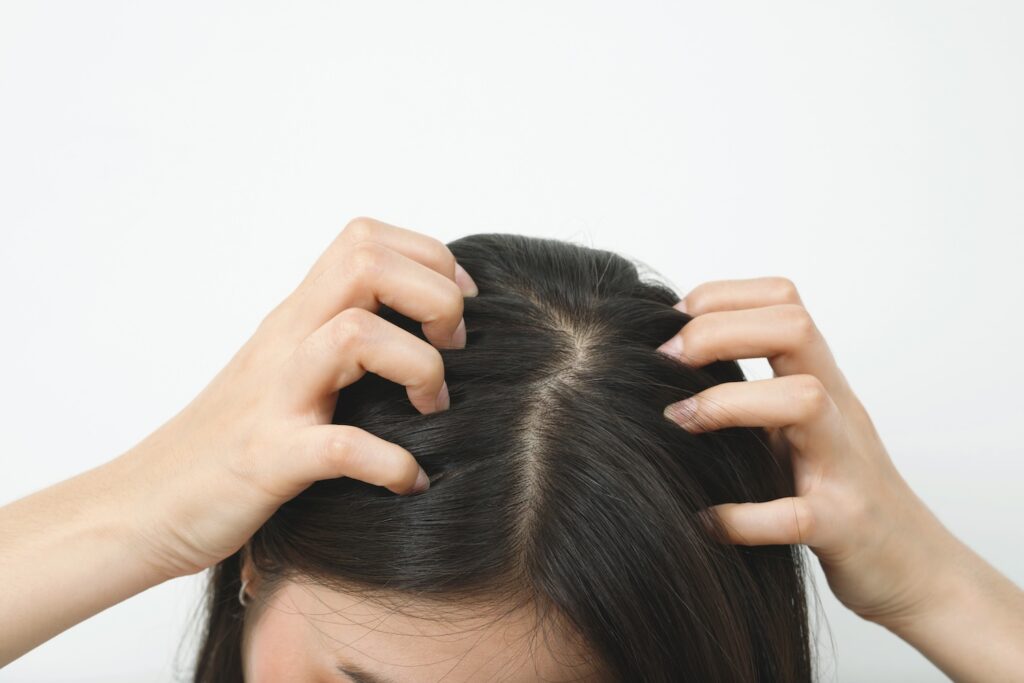-
NHS
-
Oldham Services
-
Shop
-
Help & Advice
-

Living with scalp eczema can be incredibly frustrating. The constant itching, flaking, and discomfort can affect your daily life and confidence. There are several effective ways to manage your symptoms and get back to feeling like yourself – and we’re here to help you find what works best for you.
Scalp eczema is a common skin condition that causes red, itchy, and inflamed patches on your scalp. You might notice dry, scaly skin that flakes off, similar to dandruff but more severe. The affected areas can feel sore, burn, or become crusty. Many people also experience intense itching, which can be particularly troublesome at night.
Unlike regular dandruff, scalp eczema patches can be quite thick and often spread beyond your hairline to your forehead, behind your ears, or the back of your neck. It can affect anyone at any age, from babies (where it’s often called cradle cap) to adults.
The most common type of scalp eczema is seborrheic dermatitis – you’ll recognise this as red, scaly rash patches covered with greasy-looking white or yellow scales. It often appears on areas where you have the most oil-producing glands, which is why it’s common on the scalp.
If you have atopic dermatitis, you might notice extremely itchy, dry skin patches that can become thick and darker over time due to scratching. People with atopic dermatitis often have a personal or family history of other allergic conditions like asthma or hay fever.
Contact dermatitis on the scalp happens when your skin reacts to something it touches, like a new shampoo or hair dye. The reaction usually appears quickly and clears up when you stop using the product that caused it.
While technically not a type of eczema, psoriasis can look very similar and is often confused with scalp eczema. The key difference is that psoriasis typically causes thicker, silvery-white scales that can be more difficult to remove. If you’re unsure whether you have scalp eczema or psoriasis, it’s important to get a proper diagnosis, as the treatments can differ.
While we don’t know exactly what triggers scalp eczema, several factors can make it worse:
Common external triggers include:
If you’re looking to get rid of eczema on your scalp, there are proven treatments that can help you take control of your symptoms and get back to having a healthy, comfortable scalp.
Medicated shampoos are often the first step in treating scalp eczema. Aveeno Skin Relief Soothing Shampoo contains colloidal oatmeal and is fragrance-free, making it perfect for sensitive, itchy scalps. It helps calm inflammation while gently cleansing your hair and scalp.
Polytar Shampoo is particularly effective if you have severe scaling or flaking. It contains coal tar, which helps slow down the rapid growth of skin cells and reduces inflammation. You might notice the distinctive smell, but many people find the relief it provides is worth it. Use it 2-3 times a week, leaving it on your scalp for 5 minutes before rinsing.
While thick, ointment-based emollients are great for body eczema, they’re not ideal for your scalp as they’re difficult to wash out and can make your hair look greasy. Instead, look for lighter formulations like lotions and gels.
E45 offers several lightweight options that soak in quickly without leaving residue. For particularly scaly patches, Sebco is highly effective. It combines a coconut oil base with salicylic acid to help remove scales while moisturising the skin underneath.
For more severe flare-ups, topical steroids can provide quick relief. Elocon Scalp Lotion is a moderate-strength steroid specifically designed for scalp application. It comes with an easy-to-use applicator that helps you target affected areas through your hair.
Eumovate Cream is another option, particularly good for moderate eczema. It’s slightly milder than Elocon but still effective at reducing inflammation and itching. Both should only be used as directed by your GP or pharmacist, usually for short periods, to control flare-ups.
Getting the right treatment for your scalp eczema shouldn’t be complicated. At Click2Pharmacy, our dedicated Online Eczema and Dermatitis Clinic makes it easy to get both over-the-counter and prescription treatments for your symptoms.
Simply fill in our online consultation form with details about your scalp eczema symptoms. One of our licensed pharmacists will review your consultation, and if approved, we’ll deliver your treatments directly to your door, with next-day delivery available.
Start your consultation at our Online Eczema and Dermatitis Clinic today and take the first step towards a healthier scalp.

